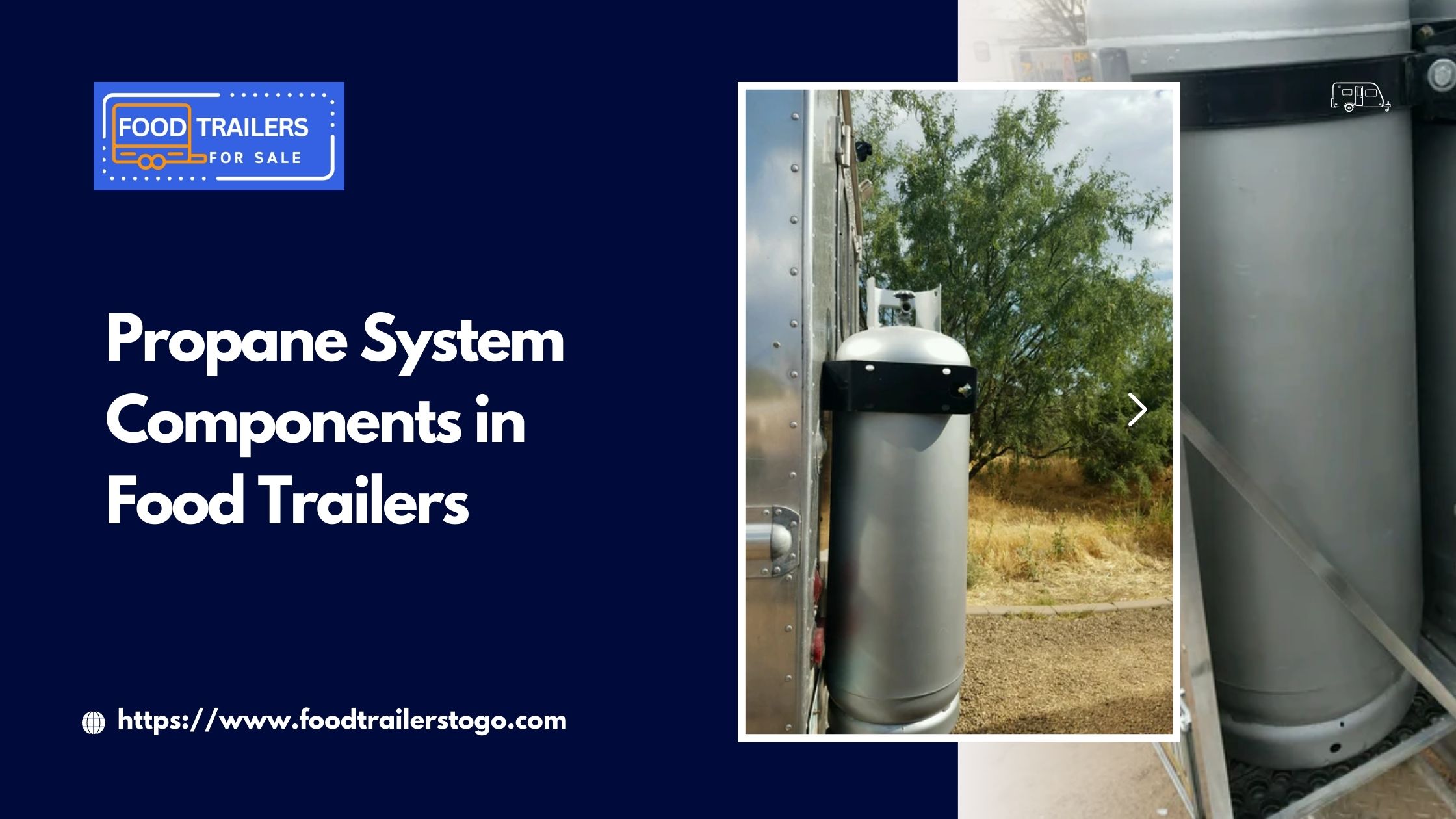Food trailers offer a unique opportunity for aspiring entrepreneurs to explore their culinary passions while enjoying the freedom and flexibility of mobility. However, as with any commercial kitchen, proper equipment and systems are essential to ensure smooth operations. One critical system in food trailers is the propane system. Whether you’re just starting or looking to improve your current setup, understanding the components of your propane system is crucial for safety, efficiency, and performance.
In this article, we’ll dive deep into A Beginner’s Guide to Understanding Propane System Components in Food Trailers, covering everything from the basics of propane use to the specific components involved in the system. By the end of this guide, you’ll have a solid understanding of how the propane system works and how to maintain it, ensuring a seamless experience as you run your food trailer.
The Importance of Propane in Food Trailers
Propane is the primary source of fuel for many food trailers, powering essential equipment such as stoves, ovens, fryers, and even refrigerators. It provides the energy needed for cooking and heating, making it indispensable for mobile food businesses. Understanding the propane system components is key to ensuring your food trailer operates safely and efficiently.
Unlike fixed kitchen setups, food trailers require a carefully designed and portable propane system to handle the demands of a commercial kitchen. Without a reliable propane system, your food trailer’s equipment could be rendered useless, halting operations and resulting in potential financial loss.
Key Components of a Propane System
In order to effectively use propane in your food trailer, it’s important to understand the basic components of the propane system. The following are the main parts of the system:
1. Propane Tank
The propane tank is the heart of the system. It holds the liquid propane gas that powers your equipment. When purchasing a propane tank for your food trailer, you need to choose one with the right capacity to meet the energy demands of your cooking equipment. Tanks are available in various sizes, typically ranging from 20 pounds (small) to 100 pounds (large).
Types of Propane Tanks for Food Trailers:
- 20-pound tanks: Suitable for smaller food trailers with fewer appliances.
- 40-pound tanks: Ideal for medium-sized trailers with a couple of appliances.
- 100-pound tanks: Best for larger food trailers with multiple cooking units.
2. Regulator
The regulator is a critical component that controls the flow of propane gas from the tank to your cooking equipment. It reduces the high pressure from the tank to a usable pressure that is safe for cooking. Without a properly functioning regulator, your propane-powered appliances could be damaged or fail to work correctly.
There are different types of regulators based on your trailer’s needs, including single-stage and two-stage regulators. A two-stage regulator is typically recommended for food trailers to ensure consistent gas pressure under varying conditions.
3. Hoses
Hoses are responsible for transporting propane from the tank to the appliances in your trailer. They come in various lengths and are designed to withstand high-pressure propane gas. It’s crucial to regularly inspect your hoses for any signs of wear, cracks, or leaks, as these could lead to dangerous situations.
4. Shutoff Valves
Shutoff valves are used to control the flow of propane in the system. They allow you to isolate the propane supply in case of maintenance, repair, or emergencies. These valves are essential for ensuring the safety of your food trailer.
There are typically two types of shutoff valves:
- Manual shutoff valves: These are operated by hand and require you to turn them off manually.
- Automatic shutoff valves: These automatically shut off the propane supply when a leak or other issue is detected.
5. Appliance Connectors
Each piece of propane-powered equipment in your food trailer, such as stoves, ovens, and fryers, has an appliance connector. This component connects the appliance to the propane gas supply. It’s important to use the correct size and type of connector to ensure a proper seal and prevent leaks.
6. Ventilation System
Proper ventilation is essential in a propane-powered food trailer. Ventilation systems help ensure that the propane gas is safely distributed and that any potentially hazardous fumes are expelled from the trailer. This system typically includes vents, fans, and exhaust hoods.
Without a functional ventilation system, there could be a buildup of propane or carbon monoxide, which could lead to dangerous situations.
7. Propane Leak Detectors
Safety is paramount when dealing with propane in a food trailer. A propane leak detector is an essential component that can detect any leaks in the system. These detectors are typically installed near propane tanks, hoses, and regulators to ensure that any leaks are identified quickly before they become a serious issue.
How to Maintain a Propane System in Your Food Trailer
Maintaining your propane system is crucial for ensuring the safety and efficiency of your food trailer. Here are a few maintenance tips to keep your propane system in top condition:
- Regular inspections: Check the propane tank, hoses, and connections for any signs of wear, corrosion, or leaks.
- Test for leaks: Use a leak detection solution or soapy water to check for any leaks in the system. If bubbles form, you have a leak that needs to be addressed.
- Replace old hoses: Over time, hoses can become brittle and cracked. Replace them regularly to ensure a safe and efficient propane system.
- Monitor propane levels: Always keep track of the propane levels in your tank to ensure you don’t run out of fuel during peak hours.
- Hire a professional: If you’re unsure about any aspect of your propane system, it’s always a good idea to hire a professional technician to inspect and maintain the system.
Overview of Propane System Components
| Component | Description | Maintenance Tips |
|---|---|---|
| Propane Tank | Holds the propane gas needed to fuel your equipment. | Inspect regularly for rust and leaks. |
| Regulator | Controls and reduces the gas pressure for use by appliances. | Check for damage and ensure proper connection. |
| Hoses | Transport propane from the tank to your appliances. | Inspect for cracks, leaks, and wear. |
| Shutoff Valves | Allow you to isolate the propane supply for maintenance or emergencies. | Test for proper function. |
| Appliance Connectors | Connect propane-powered equipment to the gas supply. | Ensure they are properly sealed and secure. |
| Ventilation System | Expels hazardous fumes and ensures safe gas distribution. | Clean filters and check exhaust regularly. |
| Propane Leak Detectors | Detect leaks in the propane system. | Test regularly for functionality. |
Common Propane System Issues and How to Fix Them
While propane systems are generally reliable, there are a few common issues that food trailer owners may encounter. Understanding these issues can help you resolve them quickly and safely:
- Propane Leaks: Leaks can occur at any point in the system, from the tank to the appliances. Always inspect your system regularly for leaks, and use a leak detection solution to find any problem areas.
- Inconsistent Gas Flow: If your appliances are not receiving a steady flow of propane, it could be due to a faulty regulator or blocked hose. Check the regulator for wear, and ensure that the hoses are free from any obstructions.
- Out of Gas: Running out of propane during peak hours can be a major inconvenience. Always monitor your propane levels, and have a backup tank on hand in case you run low.
FAQs About Propane System Components in Food Trailers
1. How do I know if my propane tank is empty?
You can use a propane gauge or check the weight of the tank to determine if it’s empty. Additionally, listen for a hissing sound from the tank or the lack of flame from your appliances.
2. Can I use a regular gas tank in my food trailer?
No, you must use a tank specifically designed for propane. These tanks are built to handle the pressure and ensure safe use in food trailers.
3. How often should I replace the hoses in my propane system?
Inspect your hoses regularly, and replace them every 3-5 years or sooner if you notice any signs of damage or wear.
4. What should I do if I smell propane in my food trailer?
If you smell propane, immediately turn off all gas valves, open the windows for ventilation, and contact a professional to inspect the system.
5. Can I install a propane system myself?
While it’s possible to install a propane system, it’s recommended to hire a licensed professional to ensure the system is set up correctly and safely.
Conclusion
In conclusion, A Beginner’s Guide to Understanding Propane System Components in Food Trailers provides the essential knowledge you need to manage your propane system effectively. By understanding the components involved, performing regular maintenance, and being proactive about safety, you can ensure that your food trailer runs smoothly and safely.
Remember, your propane system is a critical part of your food trailer’s operations, so never underestimate the importance of regular checks and maintenance. If you’re ever in doubt, don’t hesitate to consult professionals like Food Trailers to go for expert advice and high-quality equipment.

